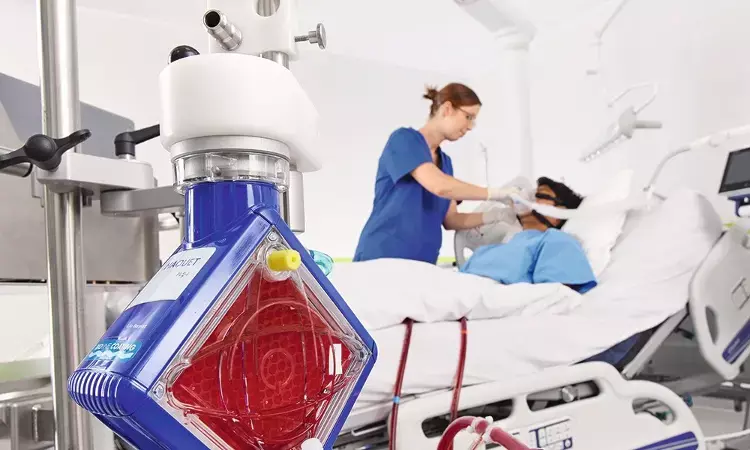- Home
- Medical news & Guidelines
- Anesthesiology
- Cardiology and CTVS
- Critical Care
- Dentistry
- Dermatology
- Diabetes and Endocrinology
- ENT
- Gastroenterology
- Medicine
- Nephrology
- Neurology
- Obstretics-Gynaecology
- Oncology
- Ophthalmology
- Orthopaedics
- Pediatrics-Neonatology
- Psychiatry
- Pulmonology
- Radiology
- Surgery
- Urology
- Laboratory Medicine
- Diet
- Nursing
- Paramedical
- Physiotherapy
- Health news
- Fact Check
- Bone Health Fact Check
- Brain Health Fact Check
- Cancer Related Fact Check
- Child Care Fact Check
- Dental and oral health fact check
- Diabetes and metabolic health fact check
- Diet and Nutrition Fact Check
- Eye and ENT Care Fact Check
- Fitness fact check
- Gut health fact check
- Heart health fact check
- Kidney health fact check
- Medical education fact check
- Men's health fact check
- Respiratory fact check
- Skin and hair care fact check
- Vaccine and Immunization fact check
- Women's health fact check
- AYUSH
- State News
- Andaman and Nicobar Islands
- Andhra Pradesh
- Arunachal Pradesh
- Assam
- Bihar
- Chandigarh
- Chattisgarh
- Dadra and Nagar Haveli
- Daman and Diu
- Delhi
- Goa
- Gujarat
- Haryana
- Himachal Pradesh
- Jammu & Kashmir
- Jharkhand
- Karnataka
- Kerala
- Ladakh
- Lakshadweep
- Madhya Pradesh
- Maharashtra
- Manipur
- Meghalaya
- Mizoram
- Nagaland
- Odisha
- Puducherry
- Punjab
- Rajasthan
- Sikkim
- Tamil Nadu
- Telangana
- Tripura
- Uttar Pradesh
- Uttrakhand
- West Bengal
- Medical Education
- Industry
Extracorporeal membrane oxygenation increases recurrent bacteremia risk

There is a risk of recurrent Enterococcus bacteremia or Staphylococcus aureus bacteremia (SAB) in patients who stay on extracorporeal membrane oxygenation (ECMO) after antibiotics have been completed, says an article published in Heart & Lung: The Journal of Cardiopulmonary and Acute Care.
While there is guidance for managing blood stream infections with different invasive devices, there is presently little evidence to advise antibiotic selection and duration in patients getting extracorporeal membrane oxygenation. As a result, Joseph E. Marcus and colleagues undertook this study to assess the management and outcomes of thirty-six patients on ECMO with Staphylococcus aureus and Enterococcus bacteremia.
Blood culture data from patients with Staphylococcus aureus or Enterococcus bacteremia who received ECMO assistance at Brooke Army Medical Centre between March 2012 and September 2021 were analyzed retrospectively.
The key findings of this study were:
During the research period, 25 (9%) of the 282 patients who had ECMO acquired Enterococcus bacteremia, and 16 (6%) developed SAB.
SAB occurred more frequently in ECMO than in Enterococcus (median day 2 IQR (1-5) vs. 22 (12-51), p = 0.01).
The most prevalent antibiotic duration was 28 days following SAB clearance and 14 days after Enterococcus clearance.
With initial bacteremia, 2 (5%) patients received cannula exchange, while 7 (17%) underwent circuit exchange. 1/3 (33%) of SAB patients and 3/10 (30%) of Enterococcus bacteremia patients who remained cannulated after antibiotics were diagnosed with a second episode of SAB or Enterococcus bacteremia.
This small retrospective research of patients undergoing extracorporeal membrane oxygenation (ECMO) discovered that 6% had Staphylococcus aureus bacteremia and 9% had Enterococcus bacteremia, necessitating a lengthy course of antibiotics for clearance. Recurrent bacteremia was prevalent in individuals who continued on ECMO after finishing antibiotics. This study shows how long-term ECMO usage can predispose individuals to recurrent bacteremia.
Reference:
Marcus, J. E., Ford, M. B., Sattler, L. A., Iqbal, S., Garner, C. L., Sobieszczyk, M. J., & Barsoumian, A. E. (2023). Treatment and outcome of gram-positive bacteremia in patients receiving extracorporeal membrane oxygenation. In Heart & Lung (Vol. 60, pp. 15–19). Elsevier BV. https://doi.org/10.1016/j.hrtlng.2023.02.020
Neuroscience Masters graduate
Jacinthlyn Sylvia, a Neuroscience Master's graduate from Chennai has worked extensively in deciphering the neurobiology of cognition and motor control in aging. She also has spread-out exposure to Neurosurgery from her Bachelor’s. She is currently involved in active Neuro-Oncology research. She is an upcoming neuroscientist with a fiery passion for writing. Her news cover at Medical Dialogues feature recent discoveries and updates from the healthcare and biomedical research fields. She can be reached at editorial@medicaldialogues.in
Dr Kamal Kant Kohli-MBBS, DTCD- a chest specialist with more than 30 years of practice and a flair for writing clinical articles, Dr Kamal Kant Kohli joined Medical Dialogues as a Chief Editor of Medical News. Besides writing articles, as an editor, he proofreads and verifies all the medical content published on Medical Dialogues including those coming from journals, studies,medical conferences,guidelines etc. Email: drkohli@medicaldialogues.in. Contact no. 011-43720751


